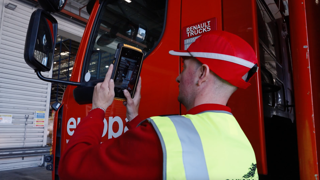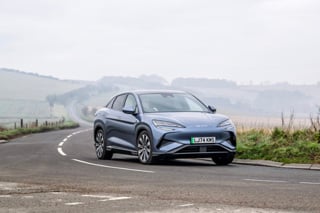By Andy Picton, chief commercial vehicle editor at Glass’s
Registrations of new light commercial vehicles (LCVs) in the UK slid by 4.5% in June, ending a record-equalling 17-month period of growth.
In total, 33,066 new LCVs were registered in June compared to 34,630 units in June 2023, which in turn was the best June in four years due to pent up demand following Covid.
A total of 177,620 registrations were recorded during the first six months of the year, a 4.5% increase on 169,926 units registered last year - the highest in three years.
Demand varied across the sectors with registrations of Pickups and Vans >2.5-3.5t Gross Vehicle Weight (GVW). recording an 18.1% and 8.3% drop respectively.
The latter’s 21,677 registrations still represented over 65.5% of all units registered in the month but was the sector’s second successive month of decline.
Vans in the Below 2.0 tonne sector recorded a 58.7% increase (806 units), whilst Vans between 2.0 and 2.5 tonnes GVW rose by 14.0% to 7,169 units.
Ford again recorded a strong month, with the Transit Custom claiming top spot.
The Transit was second, the Ranger pickup sixth (1,686 units) and the Transit Connect (1,116 units) tenth.
The Mercedes-Benz Sprinter finished in third followed by the Renault Trafic in fourth.
The Stellantis trinity of Peugeot Partner, Vauxhall Combo (1,580 units) and Vauxhall Vivaro (1,450 units) finished in fifth, seventh and eighth places respectively, whilst the Volkswagon Transporter claimed ninth place registering 1,274 units.
Top five LCV registrations
|
YTD 2024 |
June 2024 |
June 2023 |
|||
|
Ford Transit Custom |
22,139 |
Ford Transit Custom |
4,954 |
Ford Transit Custom |
4,737 |
|
Ford Transit |
15,983 |
Ford Transit |
2,730 |
Ford Transit |
3,404 |
|
Ford Ranger |
10,338 |
Mercedes-Benz Sprinter |
1,911 |
Vauxhall Vivaro |
1,921 |
|
Mercedes-Benz Sprinter |
9,119 |
Renault Trafic |
1,888 |
Renault Trafic |
1,789 |
|
Vauxhall Vivaro |
8,700 |
Peugeot Partner |
1,703 |
Ford Ranger |
1,784 |
Electric van registrations
BEV registrations fell for the third month this year, down 16.8% on June 2023. 1,476 units were registered compared with 1,775 units 12 months ago.
This represented a monthly market share of 4.5% - down 0.6% on June 2023.
At the halfway point in the year, 8,353 units have been registered. This is down 5.1% on June 2023 when 8,803 units were registered.
Not likely to help the take up of electric commercial vehicles is the recent confirmation from the Mayor of London that the Congestion Charge exemption for BEVs is to be removed from 25th December 2025.
This was written into the 2018 Mayors Transport Strategy and currently applies to all BEVs, although this is likely to be challenged asking for the exemption to be continued for commercial vehicles as they cannot avoid the zone.
The BEV market share currently makes up 4.7% of the overall market, down 0.5% on twelve months ago. This is well below the onerous 10% target set and reflects a market that is stagnating through lack of proper Government support.
Manufacturers continue to produce improved zero-emission vehicles, but the run-up to the General Election has seen sales stall and caution and uncertainty creep into an already struggling sector.
Now that the new Labour Government is in place, priority must be given to re-energising demand with a sensibly priced van-specific charging network supported by economic incentives for electric van growth.
At the same time, provisions should be made available to support and grow hydrogen development in larger LCVs and trucks. Only then can the industry make a full and necessary zero-emission transition.
Vauxhall registered 424 BEVs (27.8% share of EV market) in June, over twice the volume of second placed Mercedes-Benz (160 units and 10.5% market share). Third was Peugeot with 146 units (9.6%), fourth was Ford with 144 units (9.45%) and fifth was Renault with 140 units (9.19%).
By range, 299 new Vauxhall Vivaro Electric vans hit the road in June.
In second, Renault registered 140 Kangoo E-Tech vans, with the Vauxhall Combo Electric in third with 125 vans.
The Volkswagon ID. Buzz Cargo van placed fourth with 123 new units, whilst fifth was the Ford E-Transit with 117 units.
Year-todate, BYD (100%), Maxus (12.2%). Peugeot (11.8%) and Nissan (10.9%) are currently the only manufacturers to meet the minimum 10% ZEV mandate sales share target for 2024. Vauxhall with 8.3%, and the closely grouped Volkswagen (6.4%), Toyota (6.3%) and Renault (6.0%) are all moving in the right direction.
Ford, Maxus and Mercedes-Benz registered an additional 48 BEVs above 3.5t GVW during the month, giving an overall BEV registration total of 1,524 units for June.
Used LCV market overview

Auction houses are reporting an endless supply of used stock, most of which is ex-fleet, low spec vans with varying degrees of paint and bodywork damage.
As a result, desire for this quality of stock is subdued with prices softening as buyers bid more cautiously.
Bucking the trend is any ready to retail high spec stock, ideally with a good service history and having covered sub-60,000 miles.
Generally, higher mileage or damaged stock taking a lengthy period to prep before sale, is not seen as an attractive proposition. Here conversion rates have dipped.
June recorded lower overall sales volumes, down 9.5% on May and down 8.2% on twelve months ago. Euro 6 vehicles made 80% of all vehicles sold at auction at an average age of 54.7 months.
Average mileage stood at 73,708 miles, whilst their average selling price remained static at £9,022, down £3.
A complete lack of enthusiasm for used electric vans saw sales halve to only 0.64% of the overall market, down 0.56% on May.
The average age of these vehicles was 85 months, up 19.3 months, whilst average mileage increased by over 13,000 miles to 43,575 miles.
The average selling price was down by over £325 on May at nearly £5,050.
Euro 5 stock made up the remaining 19.3% of sales, down 0.3% on the previous period.
June in detail
The average age of sold stock increased in June from 73 months to 74 months but was 7.9 months younger than twelve months ago.
Average mileage over the month increased by nearly 1.3% to 80,576 miles but was 2.8% lower than June 2023.
Overall average sale prices fell by only 0.1% during June, but 5.6% since the end of 2023 and nearly 14% in the last twelve months.
Medium vans continue to be the most popular vehicle type at auction, accounting for 32.7% of all auction sales in June.
Small vans accounted for 28.2% and Large vans 25.3%.
Volumes of sold 4x4 stock accounted for only 13.8% of all sales – up 2.3% - but attracted the strongest average sale price of £12,831, down £19 on May 2024.
Large vans covered more distance than any other vehicle type at an average of 90,027 miles. This was up over 6,225 miles on the previous month and over 4,200 miles on 12 months ago.
First-time conversion rates for June improved by 2.7% to 69.4% overall but fell 2.3% on the same point last year.
Broken down, the best conversion rates were achieved in the Small Van sector at 74.6% (up 2.6% on May), whilst a conversion rate of 64.6% (down 1.1%) in the Large Van sector returned the lowest.
Used vehicles observed for sale in the retail market last month increased by nearly 1% to just under 46,000 units.
Of these, 94.4% were diesel models, 1.76% were petrol, 0.35% were PHEV and 3.3% were BEVs. 40.2% of all vehicles on sale were valued at £20,000 or more, while 38.0% were on sale for between £20,000 and £10,000.
At the lower end of the market, those vehicles on sale in the £10,000 to £5,000 price bracket made up 17.4% of the overall market, whilst 4.4% were on sale for less than £5,000.
The average age of all vehicles remained steady, falling by only one month from 56 months to 55, whilst the average mileage also fell by 1.5% over the month to just over 58,350 miles.




















Login to comment
Comments
No comments have been made yet.